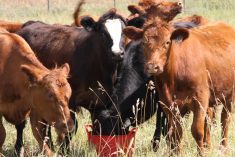The Canadian beef industry received a blow last week when an American group filed a trade action with the United States commerce department on Oct. 1.
The Ranchers-Cattlemen Action Legal Foundation alleges Canada is dumping product into the U.S. and that it gives subsidies for beef and live cattle. The group has focused its complaints on live cattle shipments to the U.S.
R-CALF is a group of northwestern U.S. producers who charge Canada subsidizes its beef trade and ships cattle illegally. Their petition now triggers subsidy-countervail and anti-dumping investigations against Canada by the U.S. department of commerce and the U.S. International Trade Commission.
Read Also

Animal protection delivery to change in Saskatchewan
The Saskatchewan government is looking for a new agency to handle animal welfare after Animal Protection Services of Saskatchewan decided not to renew its contract next year.
“Although it is not very factual, it has tended to go over well in a number of areas in the states,” said Dennis Laycraft, executive of the Canadian Cattlemen’s Association.
This latest action is not justified, but Canada must be prepared to defend its trade practices, said Laycraft.
Calls placed to the head of
R-CALF, Leo McDonnell of Columbus, Montana, were not returned.
Provincial agriculture ministers met with their federal counterpart Lyle Vanclief in Winnipeg Oct. 6 to discuss this latest grievance and other trade irritants from the Americans.
Canada exports more than half of its production in the form of beef and live cattle. Canfax figures say as of Sept. 19, about 948,600 head were shipped stateside. This includes all classes of cattle including breeding stock, feeder and fed cattle.
The majority of shipments were fed cattle. So far, about 592,500 head of fat cattle from Western Canada headed south. This is close to the number shipped last year.
In a countervailing duty case, it must be shown that producers or exporters benefit from unfair subsidies and those subsidies injure or threaten American producers.
In an anti-dumping case, petitioners must show that foreign producers sell products into the U.S. at prices below those in their own countries, or below the cost of production. The dumped imports must also cause harm or threaten harm to U.S. producers.
In 1987, 1993 and 1997, the U.S. trade commission conducted fact-finding investigations studying the factors affecting competitiveness of the Canadian and American cattle and beef industries.
The investigations found that Canadian cattle shipments to the U.S. were not detrimental to that market.















